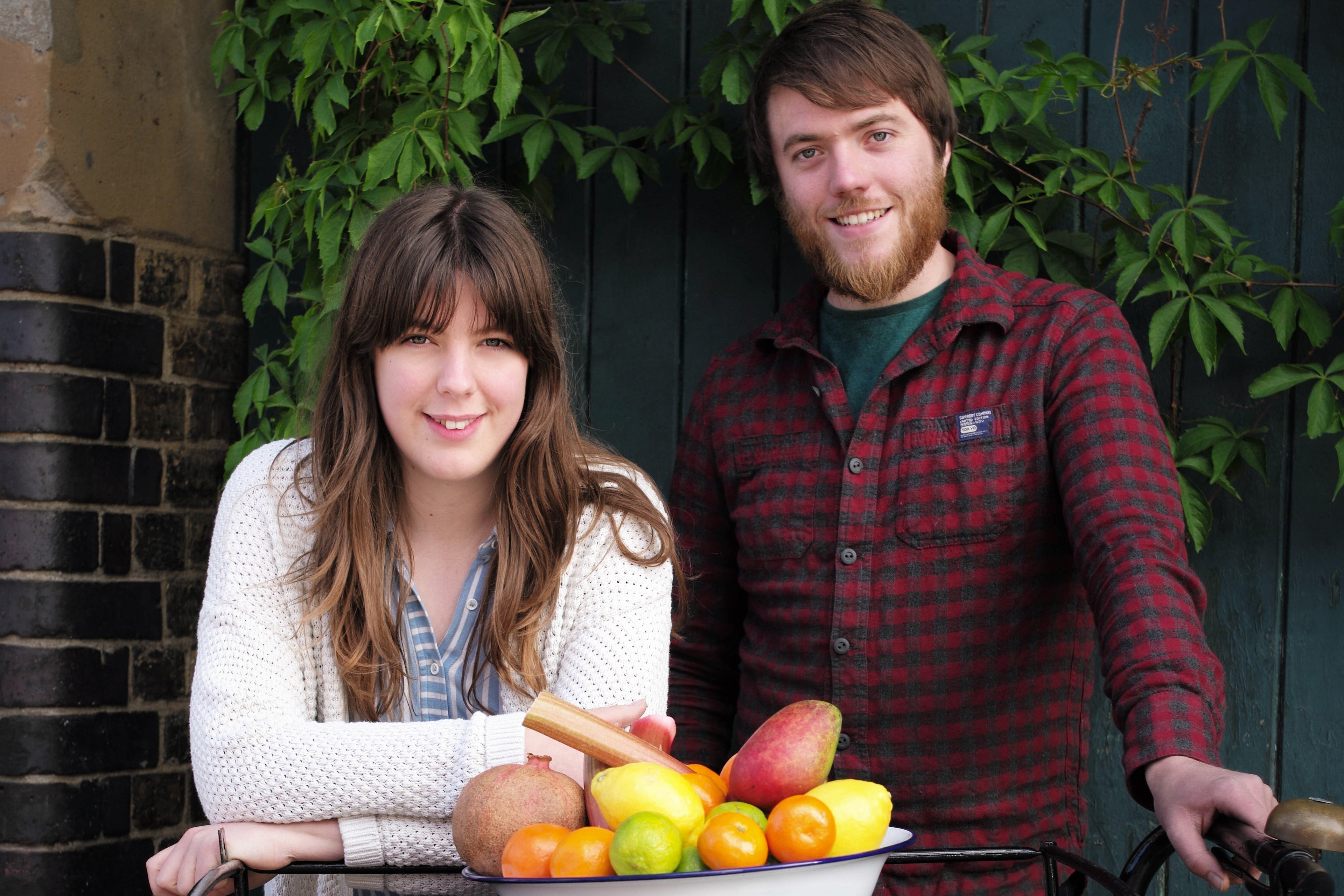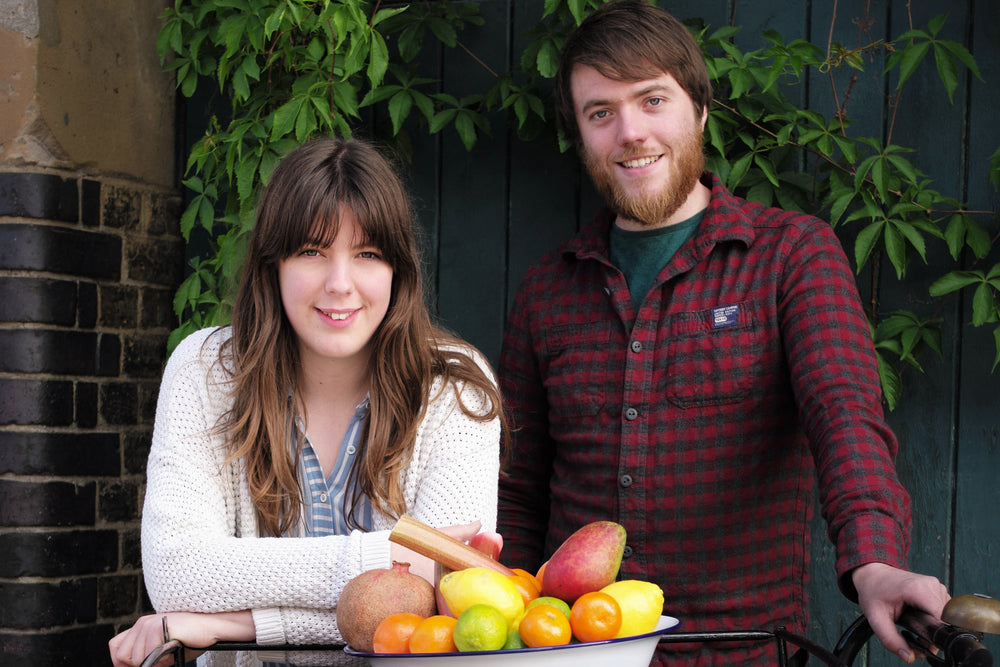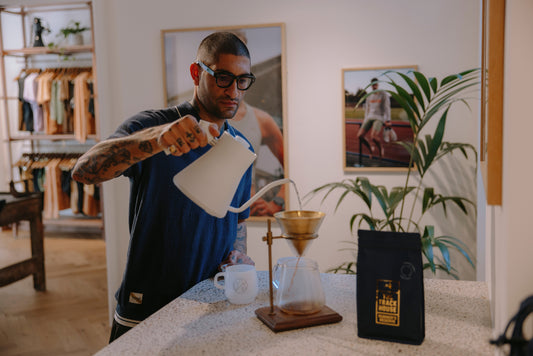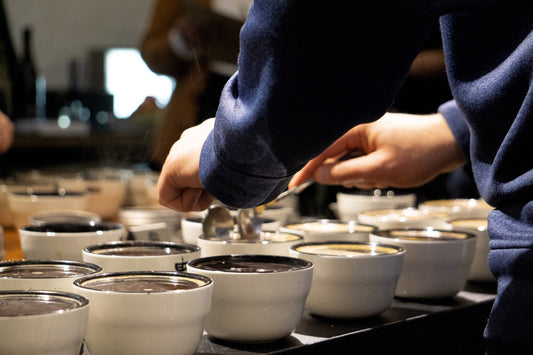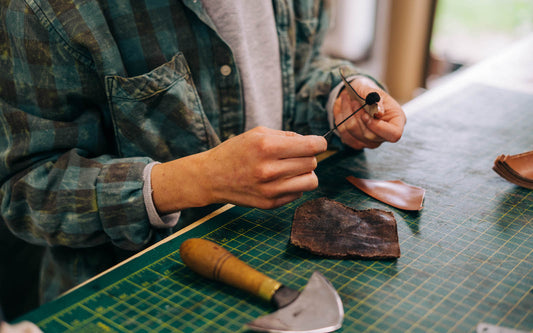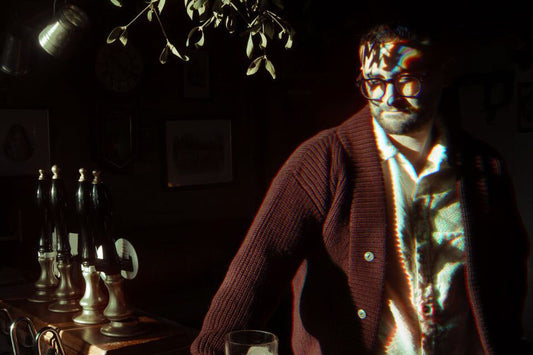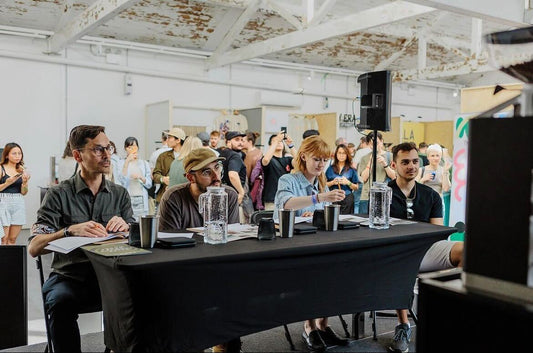
Our ‘Love Your Work’ profile series sets out to discover and showcase individuals, organisations and initiatives, all of whom share our commitment to quality.
To kick off 2019, we made the short trip from our Roastery in Bethnal Green up to the railway arches of Hackney Downs, East London, to visit award-winning soda company Square Root Soda. After a tour of the soda works and a brief introduction to the brewing process, we nipped across the street to the Pembury Tavern (owned by Five Points Brewing Company), to sit down with Square Root co-founder, Robyn Simms.
Along with her partner, Ed Taylor, Robyn founded Square Root in 2012 having spotted a gap in the market for an interesting non-alcoholic drink bursting with flavour. Their backgrounds in breweries and bars provided the perfect launch pad and over the last six years the brand's sodas have grown in popularity, both across London and further afield.
Take us back to the beginning, where did the idea for Square Root Soda come from?So you have to think back to early 2012, before there were hundreds of craft breweries in London. Ed was working at one of the first twenty or so breweries - Redemption - and I was working at a beer bar called The Euston Tap. The Five Points and Pressure Drop Breweries had also just opened, and we were very much getting involved in this fast growing brewing scene. Ed then moved to Howling Hops, which was a bar as well as a brewery, and because of that it became a bit of an unofficial meeting point most weekdays for everyone who worked at the three breweries. I’d head there too, after my shifts, and it was really interesting to talk to people who were starting something and making a physical product.
Ed and I were already making drinks at home, so we started to think about doing our own thing and what that might be. I looked at what we offered at the Euston Tap to try and work out what would be a bit different - there were twenty keg beers, eight kasks, a hundred different beers in the fridge, and then coke and diet coke. That was the extent of the non-alcoholic offering. It occurred to us that no one was really doing soft drinks in an interesting way and we thought there was a real opportunity there.
Around the same time, we were running a market stall on the weekends in Haringey where we sold a whole load of different things we’d made. I tried my hand at being a baker, but I was terrible at it - the cakes and sweets I made were never very popular, but our ginger beer would always sell out. Market stalls are a really great, low-key way of trying things out, but they can also be quite brutal - if someone is unhappy with the thing they’ve bought, they’ll tell you!
And that eventually brought you to Hackney Downs?Yes, but we’re actually moving to a much bigger space in Walthamstow in a few months time. We desperately need more space - right now, for example, we’ve got five huge pallets of fruit outside the arches which we need to squeeze inside tonight. This means shifting everything around inside the warehouse just so we can fit them in. It’s not ideal.
 Square Root’s core range of Lemonade, Ginger Beer, Root Beer and Cola.
Square Root’s core range of Lemonade, Ginger Beer, Root Beer and Cola.
We do quite different, but complementary things. I do a lot of work with people, both in terms of creating the team we have and the atmosphere within it. It’s definitely something I’ve had to learn to enjoy doing. What I did was to think back to past jobs I’ve had in bars and restaurants, and then tried to take the positive aspects from those and apply them to Square Root.
One of the things I took from my time working in restaurants was that at some point in between service, everyone would stop and sit down to eat a meal together. It’s a really great way to get to know other people on the team who you might not be working with directly during the day. So, from day one at Square Root, we’ve always sat down and had lunch together as a team. One member of the team will cook it during the morning and then at lunchtime the bottling line is switched off and we all share a meal together.
I also do a lot of the future planning. The way we often describe it is, I raise the roof, and Ed fills it up. He does all the technical stuff; our design work, the maintenance of our production equipment - that kind of thing.
And what does a typical day look like for you, if there is such a thing?You’re right, we don’t really have a ‘typical’ day, but our weeks tend to work on the same sort of schedule. Monday is probably the most interesting day, and a lot of the time our staff don’t really know what to expect when they arrive at the arches first thing. Yesterday [a Monday], for example, everyone got there and there were two tonnes of Sicilian citrus fruit, which had arrived overnight.
Production-wise, most days we’ll have six members of the team running the bottling line, and then two more creating the next day’s drink. We want everything to taste as fresh as it can, so we make the drink one day, leave it overnight to chill down to the right temperature, and then carbonate and bottle it the next day. This way we’re capturing the freshest flavours we can.
A lot of other soft drinks companies out there don’t actually make their own product. What they really do is compile a recipe, so they’ll have lemon juice sent to them by one company, sugar syrup sent to them from another company, and then they’ll mix it all together and bottle it up. We’re completely different in that we create all of our drinks from scratch. In our opinion, it makes for a far superior tasting drink, and we think that’s the only way to do it.
 A member of the Square Root team working on the bottling line. When the business moves to new premises later this year, they plan to install an automated bottling line which will not only speed the bottling process up, but increase the quality of the finished product.
A member of the Square Root team working on the bottling line. When the business moves to new premises later this year, they plan to install an automated bottling line which will not only speed the bottling process up, but increase the quality of the finished product.
I’d say our main source of inspiration comes from growers. A lot of the time we’ll randomly come across, or be introduced to, someone who grows something which we think will taste interesting. And other times, it’s from having really good relationships with the farmers we’re already working with. Last year, for example, we found out that our pear farmer also had a small grove of quince trees. They weren’t doing anything with them so we took them and we made a drink for Little Duck, a small brand which makes shrub and vinegar-based drinks, and that just came about from a conversation with the farmer after he’d delivered some fruit at six o’clock in the morning.
Largely, the drinks ideas either come from finding an interesting ingredient, or, rather selfishly, from wanting to fulfill a personal need. I stopped drinking last January and I spent the year really missing drinks which have more of an adult, or bitter, flavour. So for Christmas we created a range of non-alcoholic cocktails which were my answer to craving those flavours, especially around Christmas time. At least that was my aim when I started the project. In the end, I became too busy to work on it myself, so I left it with the team and they did an amazing job.
The team are great at coming up with ideas and suggesting drinks we might do. Every year we do a special project as a bit of fun and as a Christmas gift for our customers - each team member gets to invent their own flavour of soda and bring it through to a finished product. We packaged them up as our ‘Twelve Sodas of Christmas’, shipped them out, and asked people to send us feedback, voting for their favourite.
We had some really strange flavours last year. I tried to go traditional and did mince pie, but one of our team, Jake, went for the most out there drink he could think of: fried egg sandwich.
To be fair to him, he absolutely nailed the concept, it tasted exactly like a fried egg sandwich. I wouldn’t say it was a nice drink though.
It certainly sounds interesting, if not particularly delicious. And how about the process itself? Can you run us through how you actually produce your sodas?Sure. The easiest one to go through is probably our lemonade because it has the least ingredients.
It all starts with the lemons, which come from a small family farm in Sicily, and once they’re picked they’re shipped to us and arrive three days later. As soon as they arrive, our team will start to rind them [removing the peel] and then we put all of that rind in sugar syrup and cook it at a really low temperature to get all the natural oils out of the rind. Because the lemons are completely untreated, it’s safe to use the whole fruit and they’re the most incredible lemons, so it would be a shame not to use every part.
Next, we’ll juice the lemons and send off what’s left - the pith - for composting. We then sieve out the rind from the sugar syrup and add in the lemon juice. It’s then just a case of adding the right amount of water according to the recipe.
The lemonade then gets put in a big tank overnight to be chilled down to the right temperature. The next morning, we switch on the bottling line and the soda gets carbonated, filled, capped, pasteurised and labelled. Because we’re based in London, we don’t have a huge stock holding, so we try and schedule orders so that they leave us in the same week they’re bottled. This means that you could buy our lemonade and the fruit might’ve been picked as early as eight days ago.
 A bottle of Square Root's lemonade makes its way along the bottling line. Square Root's sodas can go from fruit on a tree to being sipped by a customer in as little as eight days.
A bottle of Square Root's lemonade makes its way along the bottling line. Square Root's sodas can go from fruit on a tree to being sipped by a customer in as little as eight days.
That’s a very good question. I think the hardest thing is learning to switch off. I’m in a fairly unique position in that I run a business with my partner, who I also live with, so it’s really difficult to find time where we’re not talking about what we’re doing tomorrow or what the next big project should be.
But, conversely, does working with your partner also have some advantages?Without a doubt, the main one being the support they can offer. Because we know each other so well, it’s awesome to know that you can say anything, do anything, and they’ll have your back. Also, because we spend so much time talking about work, we’re in the same mind frame. One of us might say “How about we try this?” and the other person will go “I was just thinking the same thing!”
Hackney seems to be a real hotbed for both small and established food and drink businesses. How important has it been to be surrounded by fellow entrepreneurs and business owners?Really important. I’d say our first five customers were within a mile away of where we’re sat now, and those five businesses are still our customers seven years later. Hackney is such an incredible place to meet people, share ideas and build really good relationships with those around you.
The collaborations we’ve done with other brands are primarily thanks to that proximity and those long-standing relationships. Because Ed and I have a background in beer, where there are so many collaborations going on, we thought "why shouldn’t we get involved, too?". We’re a small enough business that I can think up a crazy idea one night, and start work on it the next morning.
The first people we collaborated with were Pressure Drop Brewery, who used to be very close to here. The idea came from trying one of their beers and saying “This beer is really nice, what if we added some ginger and lime to it?”. We were both small enough businesses at the time that we could just go ahead and try it. Qe had nothing to lose.
The original beer was a 6.9% West Coast IPA - super citrusy and hoppy, and interestingly we actually added more hops, and then loads of Meyer lemons, which are a West Coast variety of lemon. It was essentially like blending it with lemonade and it made for a delicious 0.5% shandy.
 Lemons at dawn. Square Root's lemons come from a small family farm in Sicily. To ensure the freshest flavour, the lemons are picked and arrive in London just three days later.
Lemons at dawn. Square Root's lemons come from a small family farm in Sicily. To ensure the freshest flavour, the lemons are picked and arrive in London just three days later.
Our main aim is to grow the business without compromising on any of the things which we think make our sodas a really special product. We’ll be moving to a much larger space later this year and at the same time investing in an automated bottling line. This will allow us to not only speed up that area of production considerably, but also to make improvements to the quality of the product which we wouldn’t have been able to get doing it manually. In terms of making the actual drinks, we’re going to be doing that exactly the same way, so at five o’clock on a Monday we’re still going to be covered head to toe in lemon pulp.
Those things that make your sodas special - what do you think they are?The two key elements for us are direct sourcing and freshness. This means buying directly from farmers so that we know we’re getting really fresh fruit, and then processing that fruit as quickly as possible, so that all the juices going into the soda are as fresh as they can be. It’s as simple as that really and those are two things we won’t compromise on.
Which other London brands or businesses do you admire, or look to for inspiration?I absolutely adore Lillie who runs London Borough of Jam. She was doing jam way before we were doing soda and she has a really amazing approach to seasonality and quality. She's definitely part of our inspiration for making a product which doesn’t conform to what people expect it to be. She doesn’t make hard set jams and won’t use loads of pectin or sugar to make them solid. They’re soft and runny and taste intensely of the fruit they’re made from.
I’m also forever in love with E5 Bakehouse. The more they do, the more impressed I am with their capacity to take the whole process of bread making in-house. They grow their own grain and they even have their own mill now. They’re really in control of the whole process.
I'd love to one day to have a little farm where we could grow some experimental produce. I don’t think we could ever grow enough to supply the quantities we’d need, but something small scale would be fantastic. I don’t have the best track record with growing plants though. A few years ago I put together a little herb box to try and grow some stuff for the team to eat at lunchtime, but two days later someone had overturned it and spilled the soil out onto the street, so I gave up.
With thanks to Robyn for her time and the entire Square Root team for welcoming us to their soda works. Square Root’s sodas are served in cafés, bars and restaurants across London (including our own coffeebars), the UK and they’re also available to purchase directly from their website.
Share:


